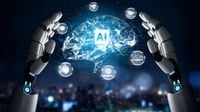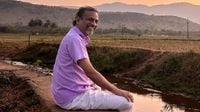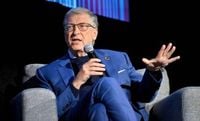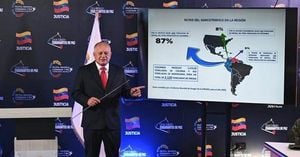In a bold prediction that carries both warning and promise, Bill Gates has declared that artificial intelligence (AI) will decimate most professions in the coming years. However, he highlights three careers that may just survive the AI revolution: coding, energy expertise, and biology.
As AI continues to advance at a staggering pace, its implications for the global workforce are staggering. Gates, known for his tech foresight, suggests that as routine tasks become automated, traditional jobs are at risk of extinction. The silver lining, however, could be the potential to reduce work hours dramatically. Imagine a world where the standard workweek could be reduced to just three days, allowing for more leisure time as AI manages the heavy lifting.
Gates insists that the key challenge is for workers to adapt quickly enough, with millions of jobs anticipated to be replaced by AI-driven automation. Those in unaffected fields might need to embrace AI rather than resist it, as harnessing its capabilities could lead to more productive and less stressful work environments.
Despite the sweeping changes that AI is expected to bring, Gates identifies three professions that might thrive: coders, energy experts, and biologists. He explains that while AI might be able to write code, it cannot entirely replace human coders. "AI needs creators to improve itself," Gates says. Mistakes in AI-generated code still necessitate human correction, indicating that human expertise will only grow more valuable in guiding AI development.
The role of energy experts is similarly deemed vital. With the complex nuances of the energy landscape—ranging from renewable resources to critical infrastructure safety—Gates stresses that human oversight remains indispensable. When managing high-stakes energy decisions, the reliance on machines alone poses risks. Human judgment is critical for ensuring safety and strategic direction within the sector.
In the world of biology, the narrative changes. While AI excels at analyzing data and diagnosing diseases, Gates maintains that it lacks the capacity for true creativity and intuition, essential for groundbreaking scientific discoveries. AI can assist in data processing but cannot innovate or operate with the same human insight. Thus, biologists, when paired with AI, will lead the charge in research and innovation.
As the AI landscape continues to evolve, predicting its impact is daunting. Gates likens the current situation to early internet days, insisting that predicting where AI will lead us over the next decade remains elusive. However, adapting and learning to work alongside AI has become imperative for survival in the job market.
The theme of adaptation extends to other voices in the tech world. Zoho founder Sridhar Vembu has also expressed concerns about the growing impact of AI on coding jobs. His claims indicate that AI may navigate as much as 90% of coding tasks, automating repetitive coding work that presents what he describes as accidental complexity. Yet, essential complexity requiring human intelligence cannot be so easily replaced.
Vembu emphasizes on X (formerly Twitter), “When people say 'AI will write 90 percent of the code,' I readily agree because 90 percent of what programmers write is 'boilerplate.'” His remarks highlight the distinction between repetitive coding tasks that AI can handle and the intricate, creative demands only human programmers can fulfill.
Echoing these sentiments, OpenAI’s CEO Sam Altman noted that AI is already responsible for over 50% of code generation across various companies. In his remarks, he suggests that while AI enhances productivity, the potential reduction in the number of software engineers is a legitimate concern as automation advances.
Meanwhile, risk analyst Manab Majumdar calls for proactive measures in the face of AI’s disruptive effects on job security. He warns that mediocre software developers could find themselves sidelined within the next decade. In a post on LinkedIn, he advises professionals to upskill, seek secondary income sources, and pivot toward more business-oriented roles to mitigate the risks posed by automation. “The ripple effects of this change could hit far beyond the tech sector,” he warns, stressing that the implications of job losses could cascade into economic impacts.
Majumdar’s analysis serves as a wake-up call emphasizing that adaptability will be crucial for those who wish to remain competitive in an AI-driven job market. His concerns encapsulate the prevailing sentiment among tech experts that those unwilling to evolve with the technology might face obsolescence.
As these thoughts and predictions coalesce, the question for many remains: Are you in one of the professions that AI cannot easily replace? Or is it time for you to reconsider your career path? The future is unfolding at a breathtaking speed, and those most prepared to adapt will be the ones who thrive.
Ultimately, Gates and his contemporaries affirm that the future of work will not only be shaped by the rise of AI but also by the willingness of professionals to collaborate with it in innovative and meaningful ways. As we stand on the precipice of a new era, embracing change will be essential—whether through enhancing our skills or redefining our job roles in the age of intelligence.






